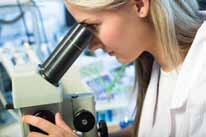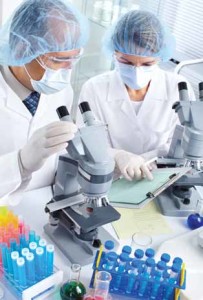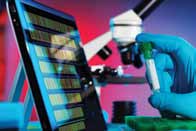The Genetic Link To Cancer
 Scientists have known for over 100 years that there is a genetic link to many types of cancer; however, it has only been in the last 10-15 years that research has shed significant light on just how intricate and complicated those links really are. Unlike diseases such as sickle-cell anemia or cystic fibrosis that are caused by changes or mutations in the DNA sequence of a single gene, the genetic relationship to cancer is much more diverse and highly complex.
Scientists have known for over 100 years that there is a genetic link to many types of cancer; however, it has only been in the last 10-15 years that research has shed significant light on just how intricate and complicated those links really are. Unlike diseases such as sickle-cell anemia or cystic fibrosis that are caused by changes or mutations in the DNA sequence of a single gene, the genetic relationship to cancer is much more diverse and highly complex.
Genes are microscopic bits of our DNA that contain instructions on how to make the proteins the body needs to function, when to destroy damaged cells, and how to keep the cells in balance. When a gene becomes mutated, or changed, there is a higher risk of cancer. Mutations may be caused by environmental factors such as cigarette smoke, radiation, hormones, and diet. As we age, we are exposed to more of these kinds of environmental factors and the mutations in our genes build up. That is why older people usually have more incidence of cancer than younger people. However, if someone has inherited a gene mutation, that person is at an even greater risk for cancer to develop even at a younger age.
Can Cancer Be Inherited?
According to the American Cancer Society, certain types of cancer do seem to run in some families. This tendency toward inheritability can also be enhanced by a number of lifestyle risk factors such as smoking or obesity. It is also important to remember that what is inherited is the abnormal gene that could lead to cancer, not the cancer itself. Only about 5% to 10% of all cancers are inherited.
Researchers have now identified several types of cancer that seem to have a genetic link, including breast, ovarian, prostate, and colon cancers. Many women worry that breast cancer seems to run in their family. According to the American Cancer Society, a woman who has a first-degree relative (a mother, sister, or daughter) with breast cancer is about twice as likely to develop breast cancer as a woman without any family history. Still, most cases of breast cancer, even those in close relatives, are not part of a family cancer syndrome caused by an inherited gene mutation. Women with a family history of breast cancer may want to seek genetic counseling to assess their risk for the disease. Today, there are several tests that identify inherited mutations of genes that cause hereditary breast and ovarian cancer syndrome. Identifying cancer at an early stage before it has spread extensively provides a much better outcome for patients.
International Genetic Research on Cancer
The International Cancer Genome Consortium (ICGC) was organized in 2007 to launch and coordinate the largest number of international cancer research projects in history. The scientists, who are studying genetic abnormalities in tumors from over 50 different cancer types, have the common goal of comprehensively identifying the genomic changes present in many forms of cancers and making the data available to the entire research community as rapidly as possible, and with minimal restrictions to accelerate research into the causes and control of cancer around the globe. Despite huge breakthroughs and discoveries in the past five years, there is still much to learn about the genetic connection to cancer. That is one reason why Florida Cancer Specialists has developed an extensive clinical trial research program that provides more options for our patients than any other oncology practice in the state.
 An integral part of the FCS continuum of care is the Florida Cancer Specialists Foundation. The nonprofit organization provides non-medical living expenses (rent, mortgage, utilities, car payments, etc.) to qualified cancer patients by offering short-term, one-time financial support to individuals undergoing cancer treatment in the state of Florida. On Saturday, April 5, 2014, the Foundation will hold its inaugural and primary fundraiser, Rio Carnival – the Festive, Colorful, South American-themed FUNraiser at The Ritz- Carlton Beach Resort in Naples. For more information about the foundation and the event, visit https://foundation.flcancer.com/riocarnival- funraiser or call 855.585.5433.
An integral part of the FCS continuum of care is the Florida Cancer Specialists Foundation. The nonprofit organization provides non-medical living expenses (rent, mortgage, utilities, car payments, etc.) to qualified cancer patients by offering short-term, one-time financial support to individuals undergoing cancer treatment in the state of Florida. On Saturday, April 5, 2014, the Foundation will hold its inaugural and primary fundraiser, Rio Carnival – the Festive, Colorful, South American-themed FUNraiser at The Ritz- Carlton Beach Resort in Naples. For more information about the foundation and the event, visit https://foundation.flcancer.com/riocarnival- funraiser or call 855.585.5433.

Leave a Reply
Want to join the discussion?Feel free to contribute!